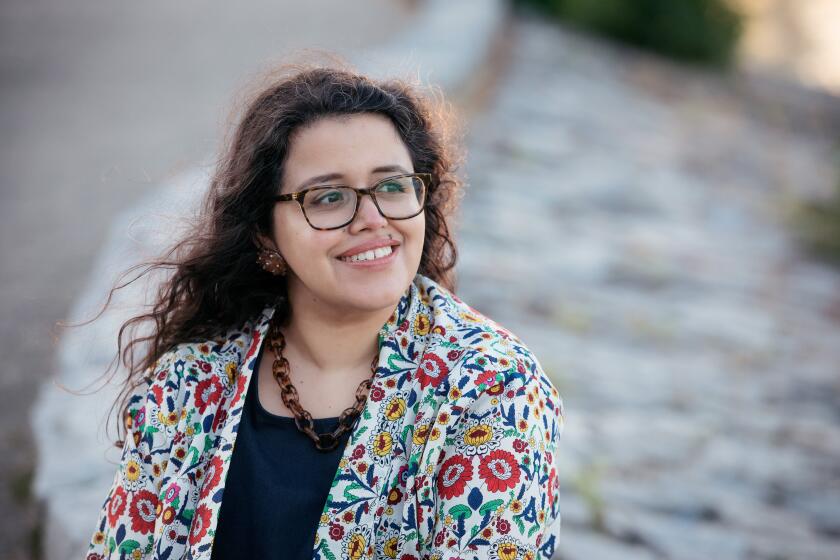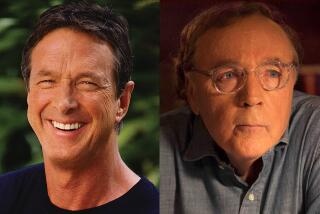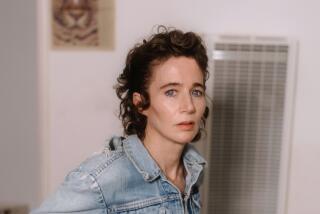Why Lydia Millet writes about what frightens her most
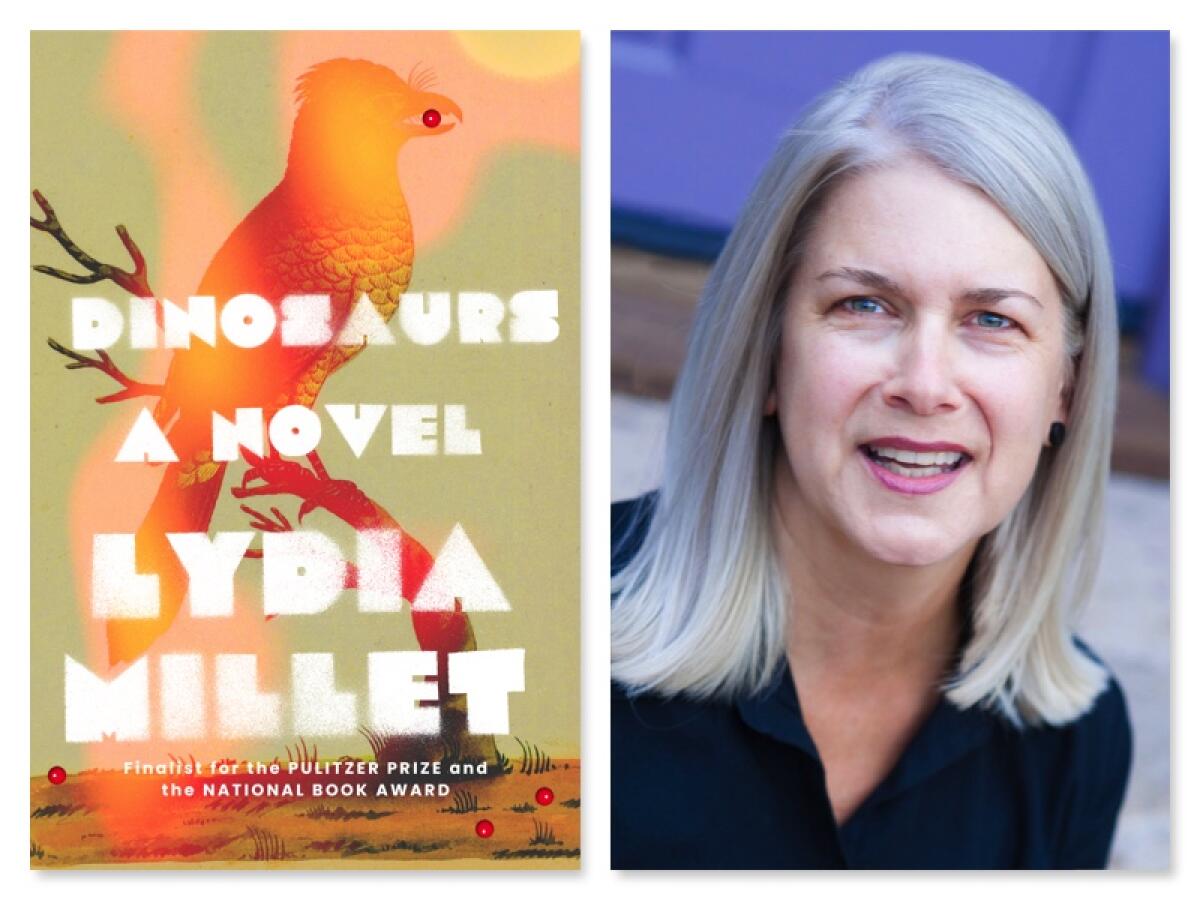
Lydia Millet, author of ‘A Children’s Bible,’ joins the L.A. Times Book Club to discuss her new novel, ‘Dinosaurs.’
- Share via
In Lydia Millet’s 2020 novel, “A Children’s Bible,” climate change takes center stage when a monster storm swamps the Eastern Seaboard, triggering a breakdown in society and forcing a group of vacationing adolescents — if not their elders — into action.
Millet returns this month with a new novel, “Dinosaurs.” The troubled ecosystem hovers in the desert background as the title conjures the haunting idea of extinction, a running theme in much of her work.
In more than a dozen books of fiction over 25 years, Tucson-based Millet has won critical acclaim for darkly humorous works touching on a wide range of topics, from grief to California real estate to the building of the atomic bomb. In recent years, she has emerged as a major Western voice on the environment, a subject she tackles in fiction as well as nonfiction essays and other writings.
Millet will join the L.A. Times Book Club on Oct. 26 to discuss “Dinosaurs” with Times reporter and novelist Jeffrey Fleishman at the Autry Museum of the American West.
Since 1999, Millet has balanced her literary efforts with work as a writer and editor at the Center for Biological Diversity, a nonprofit whose stated mission is “saving life on Earth” by preserving the diversity of the world’s plant and animal species. And despite her growing success as a novelist, she has no desire to step down from her role at the center, directed and co-founded by her former husband, Kierán Suckling.
“I do think most writers have a day job,” she says, before pausing with a laugh to exclude “writers whose work is really lucrative.”
“Literary writers of my ilk, most of them are actually in academia,” she says.
“I have not wanted to do that, because I just get so much satisfaction out of the job that I have. Academics are subject to all kinds of processes that I don’t want to be subject to. So it’s purely selfish. I love, love my job.”
Her role as chief editor at the center means she is “bombarded” every day with news about the state of the planet. “I can’t get away from reading and writing and editing materials about extinction and climate change,” she says.
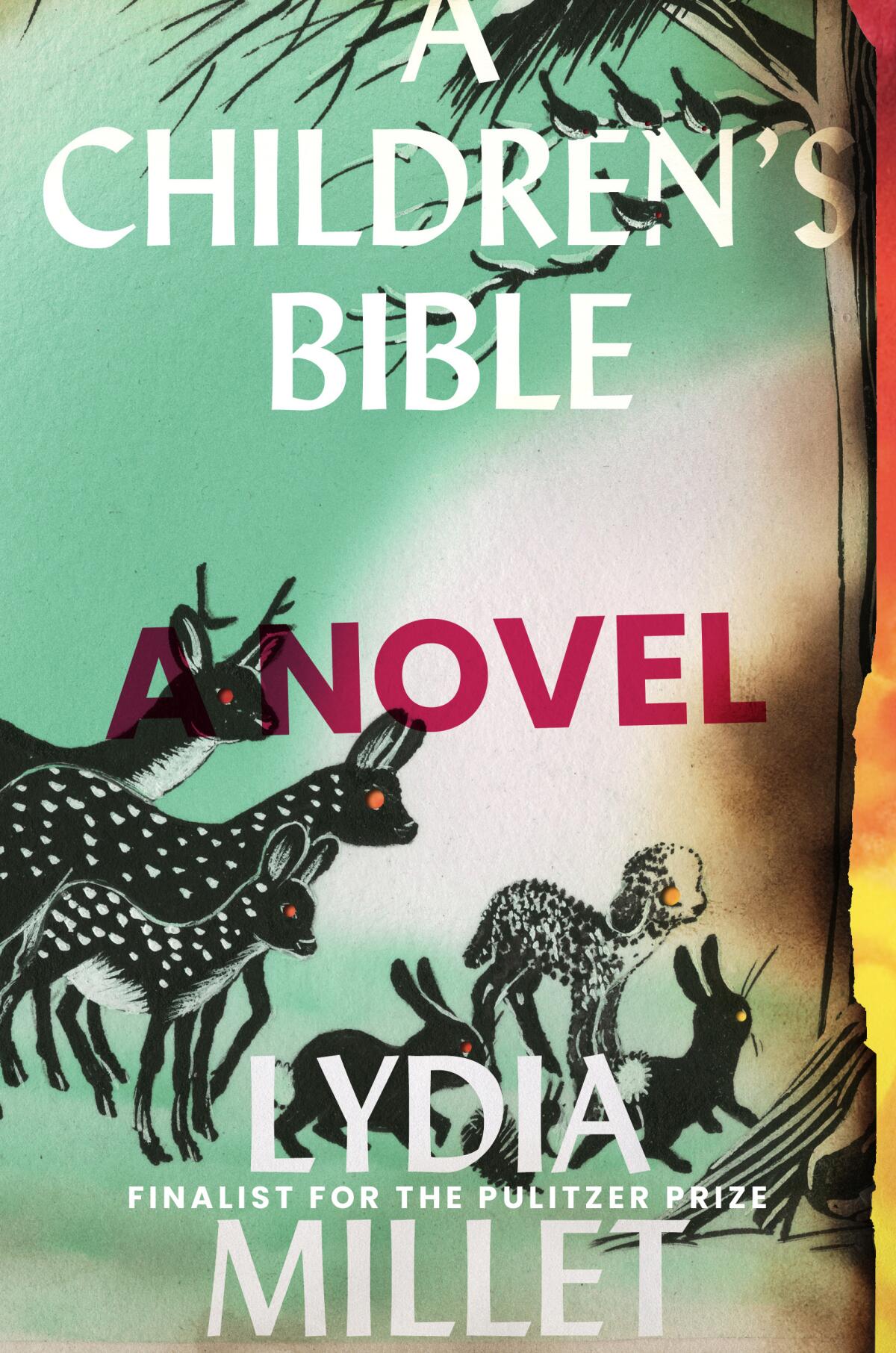
That lengthy immersion blazed a trail to “A Children’s Bible,” a parable that was something of a breakthrough for Millet — a National Book Award finalist recognized by many critics as one of the best of the year. The novel won wide praise for creatively taking on the issue of climate change and our inaction in the face of it. But Millet bristles at the idea that her writing should be pigeonholed in a new “cli-fi” genre.
“Writing on climate and extinction is a difficult realism of a clearly existential order,” Millet wrote last year in an essay in The Times. “To name it as genre is a patronizing act of containment.”
Compared with the dystopia depicted in her previous novel, “Dinosaurs” takes place in a less dramatic setting, a subdivision in Phoenix. Gil, an eccentric middle-aged loner recovering from a bad breakup, has fled there from New York, walking the entire 2,500 miles to his new home.
Shortly after Gil settles into what he thinks of as his “castle” in the desert, a family moves into a house next door that has walls made almost entirely of glass. This affords Gil a voyeuristic view of the family — the blond wife, “chiseled” husband and two children who are miniature replicas of their parents. It’s also a setup that forces Gil to lower his drawbridge as he becomes enmeshed in the lives of his neighbors and comes to terms with his own grief.
On its surface, “Dinosaurs” is a story of Gil’s desert rebirth, a swiftly moving tale told in 230 pages of spare, understated prose. Millet writes with a light and often humorous touch, but dark ideas are never far below the surface. (Millet’s Twitter bio describes her as an “American novelist interested in apocalyptic thought, extinction, climate change and other lighthearted matters.”)
In “Dinosaurs,” apocalyptic reminders literally fall from the sky in the form of birds that turn up dead in the desert, shot at night by an unknown poacher whom Gil is determined to catch in the act.
“It was one thing to hunt, then eat what you killed. Another to use the birds for target practice,” Millet writes, channeling Gil’s perspective.
“Many game hunters preferred private preserves, where they could pay for canned hunts,” Gil learns. “In those preserves doves and pheasants were raised to be hunted, then flushed out for the clients as they pulled their triggers. Some of them constantly: fingers got tired. Muscle cramping occurred. Automatic counters tallied the kills on a leaderboard.”
These birds are the dinosaurs of the title, as Millet loves to riff on the idea that birds are the living descendants of those ancient creatures that so fascinate us. Almost every chapter is named after an avian species, and Millet said she originally called the book “Men of Birds,” when it was “even more bird-oriented than it is now.”
Novelist Silvia Moreno-Garcia brings ‘The Daughter of Doctor Moreau’ to the L.A. Times Book Club Sept. 27
“The older I get, the more I am fascinated by [birds],” she says. “They’re just evolutionarily sort of perfect beings with their strength and lightness and how they can migrate these long distances — they just seem so well designed.”
Birds in their variety also represent biological diversity, a subject of deep interest for Millet.
“The extinction of species is always the thing that frightens me most in the world,” says Millet, 53, who holds a master’s degree in environmental policy from Duke University. “And, of course, it’s closely linked to climate — you can’t really extricate them from each other. It is the stuff of which nightmares are made, for me. I don’t think I’ll ever be able to stop writing about extinction.”
Although Millet’s science background informs her work, human relationships drive the narrative in “Dinosaurs,” which the author describes as “a book of barely cloaked metaphors,” starting with that glass house.
Millet says she was inspired in part by a Southern California home where she and her family once stayed that featured not only glass walls but also a glass floor, allowing them to see the creek running beneath it.
“It’s a beautiful house — it made an impression on me,” Millet says. “I like the idea of this kind of stage set that you can look into, like it was my own dollhouse that I could play with in this book.”
As for Gil’s walk — that five-month odyssey, kaleidoscopically reduced to a single page in the novel — the author says she was paying tribute to her partner Aaron, who hiked the Appalachian Trail before leaving New York to join Millet in Tucson. But otherwise, Gil shares little in common with Aaron, she says, other than perhaps a self-deprecating wit.
In Gil, Millet has created a sympathetic portrait of a wealthy man who tries to do what is right. The portrait of Gil, she says, is based on “people I know and love,” who are wealthy, privileged, but sometimes drifting. “It is possible to be lost in the world, even from a position of privilege,” Millet says. “Sometimes stupid wealth — not regular, everyday wealth that you just earn by having a good job — but stupid wealth can really be extremely debilitating.”
Gil, an orphan who inherited family money, is at times wracked with privilege-induced guilt and seeks out ways he can contribute, not only donating money but also volunteering his time to causes he cares about, including a shelter for abused women. Even more important are the contributions he makes to the lives around him, including his two friends from New York, Vic and Van Alsten, and the family next door. Gil becomes especially close with the family’s young son, Tom, teaching him to cook a meal and helping him shut down a bully.
“We tend to have a very narrow view in our culture of what parenting is,” Millet says. “I think that parenting has to extend far beyond the confines of just our own children.
“Parenthood should be a vast and future-oriented gesture of care.”
Wolk is a Seattle-area journalist who has been a correspondent for Reuters and MSNBC.com.
Book Club: If You Go
What: Author Lydia Millet joins the L.A. Times Book Club to discuss “Dinosaurs” with Times reporter and novelist Jeffrey Fleishman.
When: 7 p.m. Pacific Oct. 26. Doors open at 6 p.m.
Where: Enjoy an evening of words, wine and browsing galleries at the Autry Museum of the American West, 4700 Western Heritage Way, Los Angeles. Get tickets.
Book club newsletter: Sign up for the latest news and events: latimes.com/bookclub
More to Read
Sign up for our Book Club newsletter
Get the latest news, events and more from the Los Angeles Times Book Club, and help us get L.A. reading and talking.
You may occasionally receive promotional content from the Los Angeles Times.
